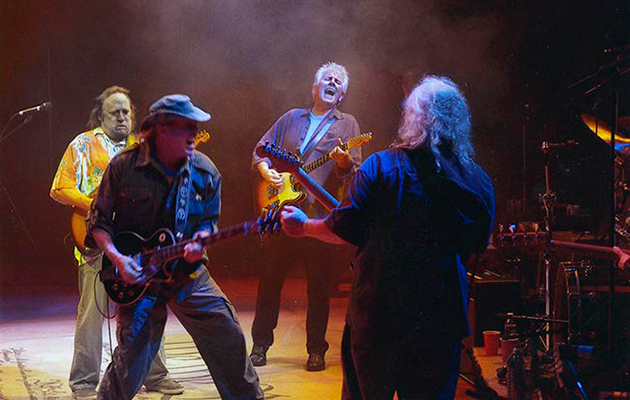“WE THOUGHT WE COULD CHANGE THE WORLD…”
The first couple of years after CSNY split were generally good for Stills – he had a hit single with “Love The One You’re With” and his first solo album, Stephen Stills, initially sold better than Neil’s ’60s comedown classic, After The Gold Rush. Crosby and Nash also scored with their solo albums, If I Could Only Remember My Name and Songs For Beginners, also released in 1971.
They were soon, however, wholly eclipsed by Neil, whose 1972 album, Harvest, made him the biggest-selling solo artist in the world. Although Young would famously turn his back on mainstream success, CSN would live out the rest of their careers in his creative shadow, Neil incrementally assuming an iconic status that in the minds of many placed him alongside Dylan in the thin ranks of ’60s veterans whose music continued to matter.
Even as Young’s star ascended, Stills’ career started to plummet, his descent into cocaine dementia scuppering serial CSNY reunions. When the band convened in Maui in 1973 with the intention of recording a new album together, Stills, deranged by coke, had taken to wearing army fatigues, convinced by then that he had seen active service in Vietnam. The Human Highway album was quickly aborted. His behaviour on the band’s 1974 world tour – “The Doom Tour,” as Crosby cheerlessly christened it – was so obnoxious that Young preferred to travel separately from the rest of the band, in an RV, with his son, a sullen witness to a tour that set a new benchmark for decadence, debauchery and excess.
Stills’ struggle with alcoholism, cocaine and freebasing, was long and difficult, his eventual sobriety hard-won. He is currently recovering from prostate cancer surgery.
“I’m fine now,” he says. “The cancer’s gone, and I’m going through all the things that one does when you lose that particular organ, like you have to wait for things to start functioning again. They [doctors] lie to you, because if they told you the truth when you’re diagnosed, guys would go, ‘Oh no, I’m not doing that.’ In which case, you fucking end up in a diaper and die. It’s not pretty. So I took steps immediately. I found out about it. I scheduled the surgery in October, so I had lots of time to prep. And you have to go through a liquid diet for a few days. So that was a lot of pounds that got put on. I looked like a water baby for a few months. In the film, I’d gained 25lbs and even made Crosby look good.”
Crosby’s own career meltdown, meanwhile, was probably even more spectacular.
He has estimated that he spent “many, many millions of dollars” on drugs, and he became addicted to heroin and cocaine. In March 1982, while driving to an anti-nuclear rally near San Clemente, California, Crosby suffered a seizure from cocaine saturation and crashed into the barrier in the centre of the highway. Police found cocaine and a loaded .45 pistol in the vehicle. Two weeks later, he was caught freebasing cocaine backstage in Dallas, Texas, and was sentenced to five years in jail. While free on appeal, he fled from rehab, and was jailed in 1985, going cold turkey during his 11 months inside. On his release, he returned to the stage with Nash and vowed to stay sober.
In 1994, around the time of the 25th anniversary of Woodstock, he had to be helped offstage, complaining that he was told he had hepatitis C, and that his liver was failing. He was broke, and he needed a transplant. And, while Crosby claims to have settled down in the aftermath of this shock, he was arrested in 2004 after going back to a New York hotel to retrieve a suitcase that contained marijuana and a loaded .45.
Looking back at all this mayhem, Crosby is not immediately inclined to apologise for his libertarian past and the Woodstock ideal to which he has forever clung.
“There are very few things about it that I think were wrong,” he tells Uncut. “I think we were right about civil rights. All men are created equal, and we need to enforce that, severely, strongly, with everything we’ve got. I think peace is better than war. I think the only thing we were wrong about was the drugs and that was only because we were innocent. We didn’t know. We had no idea. We’d only encountered pot and psychedelics and we thought they were sort of beneficial and kinda neat. And then we ran into cocaine and heroin. Oops! We were ignorant, and we didn’t know. But we survived it.”
Nash, eternally cast as the ‘sensible one’, gave up cocaine on December 9, 1984.
“I remember the date deliberately,” he says. “It was the last concert of Crosby, Stills and Nash tour, in Honolulu. We were at the Kohala Hilton. Having an after tour party. And all of a sudden, I realised that all of these people who were snorting and thought they were having a good time were not having a good time at all.
“It was a completely false thing, and I just hated it. I swore then that I would never snort it again. And I didn’t.”


